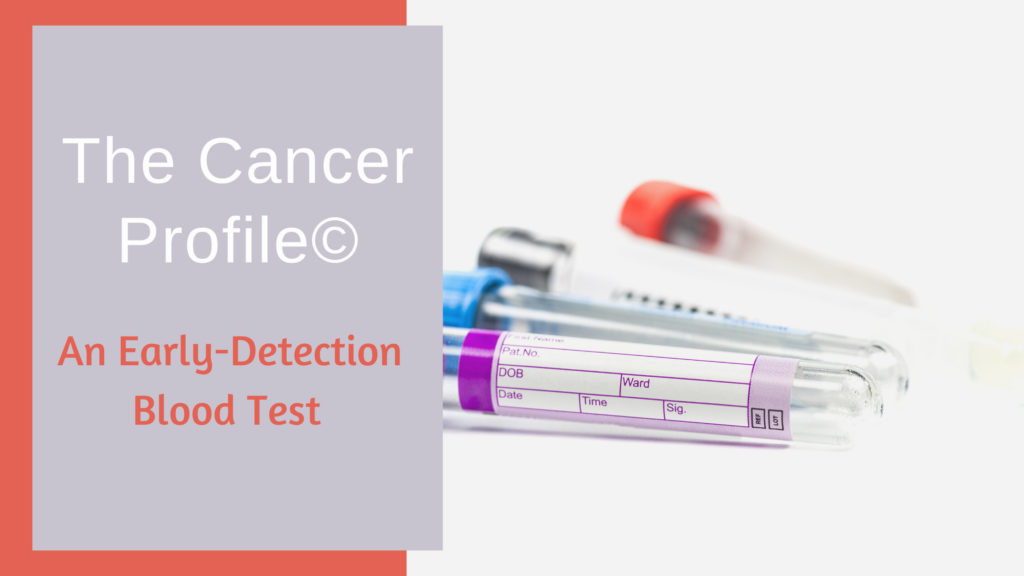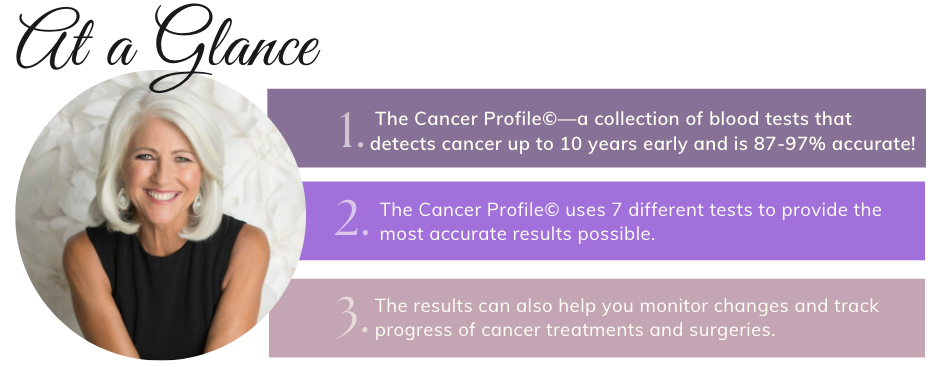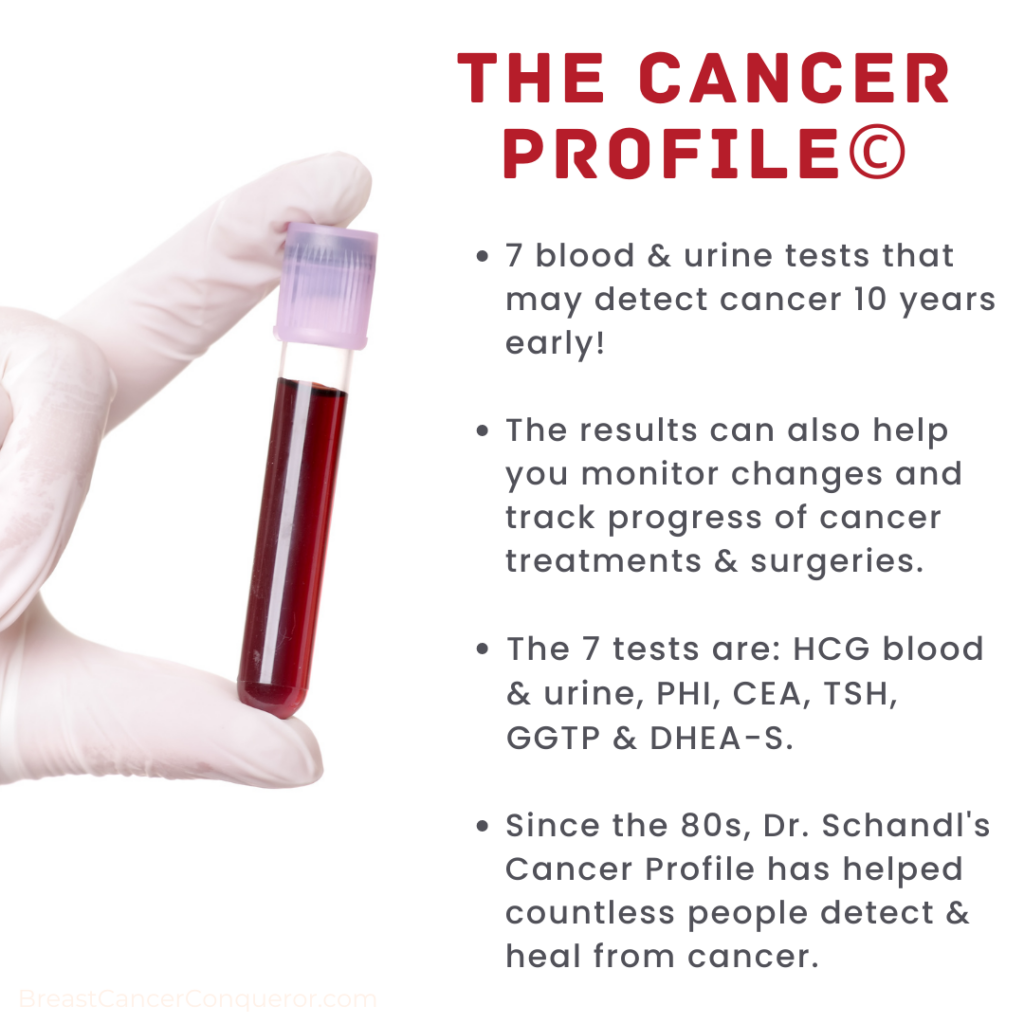

The infamous mammogram is NOT your only test option. Several tests provide safe, effective, non-invasive, and accurate answers. This blog is dedicated to one of them, The Cancer Profile—a collection of blood tests that detects cancer up to 10 years early and is 87-97% accurate!! With a ten-year heads up, you can make the necessary changes to smosh cancer quickly and easily. The test is also an excellent resource for monitoring treatment progress and success. Order your profile here.
Before and during my second healing journey, I relied on the Cancer Profile to help me monitor my progress. I found it to be a simple and cost effective way to monitor my health.
But before I get started, I want to boldly reiterate that you always have options—in testing, treatment, medicines, recovery, and preventing recurrence in every part of your life!
Below are a few other testing options that are worth checking out:
-
- SonoCiné. The SonoCiné AWBUS scan provides greater visual detail of breast tissues, including the axilla (underarm/lymph nodes). This is extra helpful for 45% of women with dense breast tissue or implants, as mammograms often have trouble providing clear and detailed images. Learn more about The SonoCiné AWBUS here.
- Onconomics Plus RGCC. This test provides crucial information on the presence of circulating tumor cells (part of cancer stem cells) and their concentration in people with a confirmed diagnosis of specific forms of cancer, including breast, colon, and prostate cancer. It will also tell you which natural (and pharmaceutical) substances would help your body the most. Learn more about RGCC tests here.
- Galleri® Test. This test scans for 50 types of cancer, many of which are not commonly screened for today, in one simple blood draw. Learn more about the Galleri® Test here.
- Thermography. Digital infrared thermographic imaging” (DITI) can spot physiological breast cancer signs 6 to 8 years before any palpable mass appears. Learn more about thermography here.
- More options are still available, and new ones are just over the horizon.
Remember: Regardless of which test you use, ALWAYS back it up with a second test. No stand-alone screening tool is 100% accurate.

The Cancer Profile
Seven safe, effective, non-invasive blood and urine tests comprise The Cancer Profile©. The strategic combination of the tests is based on how detectable biochemical changes happen to your body during its transformation into a cancerous state. Together, the results can provide such as:
- Early warning signs of cancer—up to 10-12 years in advance.
- Monitor changes within existing cancers.
- Track treatments and regimens to see progress and provide data for adjustments.
- Establish a benchmark for a tumor-removing surgery, and a retest can provide info on the surgery’s success.
Countless studies confirm that HCG levels elevate in the presence of cancer cells in the body. However, this study found that only 46% of breast cancer cases expressed HCG levels. What if you are part of the 54% that have undetectable HCG levels? HCG levels also have a 30% false negative rate. This is why The Cancer Profile uses 7 different tests to provide the most accurate results possible.
The Seven Tests That Makeup The Cancer Profile
- HCG blood serum and urine: Human Chorionic Gonadotropin can be elevated in existing cancer, stress that is leading to cancer, or in a developing case. HCG is a pregnancy hormone but is also produced by cancer cells.
- PHI: Phosphohexose Isomerase, the enzyme that regulates anaerobic metabolism. PHI can be elevated in developing or existing cancer.
- CEA: Carcinoembryonic Antigen is a cancer antigen and is often elevated in most cancers.
- TSH: Thyroid Stimulating Hormone, and many women developing or have established cancer are hypothyroid. Learn about the relationship between thyroid health and breast cancer here.
- GGTP: Gamma-Glutamyltranspeptidase, a sensitive enzyme for monitoring the liver and bile system. The liver is the chief detoxifying organ and is often affected by malignancies.
- DHEA-S: Dehydroepiandrosterone Sulfate, the adrenal “anti-stress, pro-immunity, longevity hormone,” according to Dr. Schandl. Most cancer patients, and those who are developing cancer, have low serum DHEA levels. Learn more about cancer and hormones here.
Dr. Emil Schandl
“Do a few pushups every day, and you might feel better.” This was life-changing advice that 13-year-old Emil received. Before his world-changing health career began, he endured losing friends to a Nazi death camp, being part of the Hungarian uprising, and fleeing to America across the Austrian Alps. All this gave him immense strength and wisdom that steered him to finding the secrets to health and curating The Longevity Profile®© and Cancer Profile© in the 1980s. He also started the American Metabolic Laboratories after receiving his Ph.D. and working with the world-renowned geneticist J. Herbert Taylor. Until his passing in 2018, he followed the advice and turned a few pushups into a 3-mile run, a 12-mile bike ride, and several rounds of chin-ups and pushups. All were followed by a strategic supplement and eating protocol.
friends to a Nazi death camp, being part of the Hungarian uprising, and fleeing to America across the Austrian Alps. All this gave him immense strength and wisdom that steered him to finding the secrets to health and curating The Longevity Profile®© and Cancer Profile© in the 1980s. He also started the American Metabolic Laboratories after receiving his Ph.D. and working with the world-renowned geneticist J. Herbert Taylor. Until his passing in 2018, he followed the advice and turned a few pushups into a 3-mile run, a 12-mile bike ride, and several rounds of chin-ups and pushups. All were followed by a strategic supplement and eating protocol.
Part of his supplement routine included:
- 25,000 IU Vitamin A (5 days a week) for its anti-cancer, anti-viral, pro-vision, and pro-skin properties. Learn more about Vitamin A via this blog.
- 9,000 mg of Vitamin C (5 days a week) anti-cancer, anti-bacterial, pro-healing, and pro-longevity properties and its powerful antioxidant nature. Learn more about Vitamin C via this podcast.
- 200 mcg of Selenium (5 days a week) to protect against free radical damage. Learn more about selenium via this blog.
You can learn more about Dr. Schandl’s (Ph.D., M.S., M.D.(M.A), FACB, CC(NRCC), SC(ASCP), LNC, Oncobiologist, Clinical and Nutritional Biochemist, Clinical Laboratory Director.) incredible lifestyle here.
Test, test, test—don’t stress and guess! For a $50 discount, use DRV code at checkout.